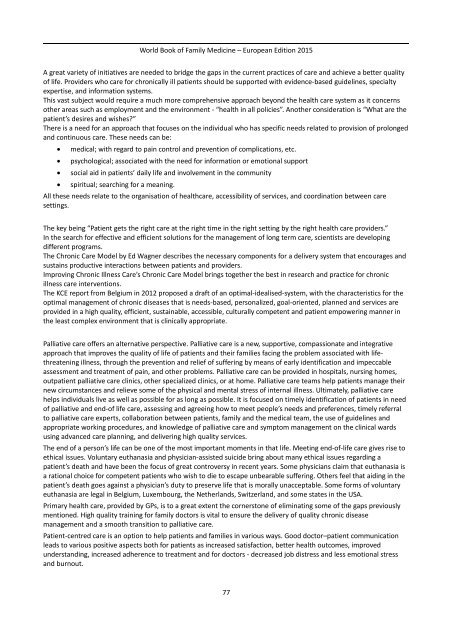Family Medicine
World Book 2015
World Book 2015
You also want an ePaper? Increase the reach of your titles
YUMPU automatically turns print PDFs into web optimized ePapers that Google loves.
World Book of <strong>Family</strong> <strong>Medicine</strong> – European Edition 2015<br />
A great variety of initiatives are needed to bridge the gaps in the current practices of care and achieve a better quality<br />
of life. Providers who care for chronically ill patients should be supported with evidence-based guidelines, specialty<br />
expertise, and information systems.<br />
This vast subject would require a much more comprehensive approach beyond the health care system as it concerns<br />
other areas such as employment and the environment - “health in all policies”. Another consideration is “What are the<br />
patient’s desires and wishes?”<br />
There is a need for an approach that focuses on the individual who has specific needs related to provision of prolonged<br />
and continuous care. These needs can be:<br />
<br />
<br />
<br />
<br />
medical; with regard to pain control and prevention of complications, etc.<br />
psychological; associated with the need for information or emotional support<br />
social aid in patients’ daily life and involvement in the community<br />
spiritual; searching for a meaning.<br />
All these needs relate to the organisation of healthcare, accessibility of services, and coordination between care<br />
settings.<br />
The key being “Patient gets the right care at the right time in the right setting by the right health care providers.”<br />
In the search for effective and efficient solutions for the management of long term care, scientists are developing<br />
different programs.<br />
The Chronic Care Model by Ed Wagner describes the necessary components for a delivery system that encourages and<br />
sustains productive interactions between patients and providers.<br />
Improving Chronic Illness Care’s Chronic Care Model brings together the best in research and practice for chronic<br />
illness care interventions.<br />
The KCE report from Belgium in 2012 proposed a draft of an optimal-idealised-system, with the characteristics for the<br />
optimal management of chronic diseases that is needs-based, personalized, goal-oriented, planned and services are<br />
provided in a high quality, efficient, sustainable, accessible, culturally competent and patient empowering manner in<br />
the least complex environment that is clinically appropriate.<br />
Palliative care offers an alternative perspective. Palliative care is a new, supportive, compassionate and integrative<br />
approach that improves the quality of life of patients and their families facing the problem associated with lifethreatening<br />
illness, through the prevention and relief of suffering by means of early identification and impeccable<br />
assessment and treatment of pain, and other problems. Palliative care can be provided in hospitals, nursing homes,<br />
outpatient palliative care clinics, other specialized clinics, or at home. Palliative care teams help patients manage their<br />
new circumstances and relieve some of the physical and mental stress of internal illness. Ultimately, palliative care<br />
helps individuals live as well as possible for as long as possible. It is focused on timely identification of patients in need<br />
of palliative and end-of life care, assessing and agreeing how to meet people’s needs and preferences, timely referral<br />
to palliative care experts, collaboration between patients, family and the medical team, the use of guidelines and<br />
appropriate working procedures, and knowledge of palliative care and symptom management on the clinical wards<br />
using advanced care planning, and delivering high quality services.<br />
The end of a person’s life can be one of the most important moments in that life. Meeting end-of-life care gives rise to<br />
ethical issues. Voluntary euthanasia and physician-assisted suicide bring about many ethical issues regarding a<br />
patient’s death and have been the focus of great controversy in recent years. Some physicians claim that euthanasia is<br />
a rational choice for competent patients who wish to die to escape unbearable suffering. Others feel that aiding in the<br />
patient’s death goes against a physician’s duty to preserve life that is morally unacceptable. Some forms of voluntary<br />
euthanasia are legal in Belgium, Luxembourg, the Netherlands, Switzerland, and some states in the USA.<br />
Primary health care, provided by GPs, is to a great extent the cornerstone of eliminating some of the gaps previously<br />
mentioned. High quality training for family doctors is vital to ensure the delivery of quality chronic disease<br />
management and a smooth transition to palliative care.<br />
Patient-centred care is an option to help patients and families in various ways. Good doctor–patient communication<br />
leads to various positive aspects both for patients as increased satisfaction, better health outcomes, improved<br />
understanding, increased adherence to treatment and for doctors - decreased job distress and less emotional stress<br />
and burnout.<br />
77


